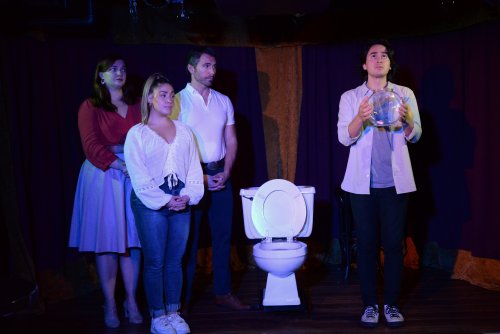I Love My Family, But…
Living with family members can be a wonderful experience, but it can also be challenging.

J.D. Daw, Julian Diaz-Granados, Jennifer Dinolfo and Katie Oxman in a scene from the new musical “I Love My Family, But…” at The Huron Club at Soho Playhouse (Photo credit: Wendy Gundrum)
[avatar user=”Scotty Bennett” size=”96″ align=”left”] Scotty Bennett, Critic[/avatar]
Good family communication involves clear, honest, respectful, and open discourse. On the other hand, poor family communication can lead to misunderstandings, conflicts, and broken relationships. Living with family members can be a wonderful experience, but it can also be challenging. Even if you love them very much, sometimes things can get awkward and go off-kilter.
I Love My Family, But…, directed by Guy Stroman, with book, music, and lyrics by Brandon Lambert and book and lyrics by Lauren Gundrum, is a musical exploration of what it means to be in a family. They accomplish this journey of ups, downs, and wobbles by highlighting specific moments in a family’s life, mostly through song.
The show is billed as a musical, but it is more concert than play, strong in music and weak in the storyline. The songs cover a lot of emotional ground, many with a humorous edge, but the book only provides a slim dramatic structure for the characters’ actions. What is missing is more detail about who the characters are and for what reason we should care about the events being depicted. The dialogue is more of an introduction to the songs than a dramatic link to the overall story.
The play is about Timmy (Julian Diaz-Granados) and the singular events that make up his memory of his family, primarily his mother and father, while he was growing up and eventually starting a family of his own. Granados provides a fine presentation of the character at different ages, beginning at six and ending with his 30th birthday. A key aspect of his performance is the deft modulation of his voice to become the various ages being depicted.

Katie Oxman and J.D. Daw in a scene from the new musical “I Love My Family, But…” at The Huron Club at Soho Playhouse (Photo credit: Wendy Gundrum)
His parents, Frank and Martha, are brought to life by the performances of J.D. Daw and Katie Oxman. While they skillfully handle the songs, they do not clearly deliver on the ages of the characters. This result may be an issue caused by the costumes and make-up. The mother and father are shown from ages 25 to 60, but there is little or no transition in the costumes and make-up to depict that period. The illusion of aging is important to the story; without it, the actor’s job is more complicated.
The girl from next door, Claire (Jennifer Dinolfo), is an energetic, constant presence in Timmy’s life. She has a crush on him from when they are children until she finally marries him. Dinolfo brings Claire to life with a high-energy performance filled with physical comedy and dance movements. What is missing is a sense of aging in the character. Her vocalizations stay within a specific range that does not give an effective illusion of the passage of time. Her singing voice comes across as shrill in certain passages, which may be a function of the constrained acoustics of the theater.
Overall the ensemble does well in bringing the characters to life given the limits of the book, but they shine when they sing the funny, clever songs. For example, in the first scene after the opening number, Oxman is holding a crying infant, Timmy, and singing “Lullaby.” It starts as a sweet song that a mother would sing to her crying baby and then moves into something a little different:
DREAM OF AN ANGEL WHO’S TUCKING YOU IN
WITH SHEETS THAT ARE MADE OUT OF SILK
WHILE I DREAM OF DRINKING A BOTTLE OF GIN
AND MIXING SOME IN WITH YOUR MILK

Katie Oxman, Jennifer Dinolfo, J.D. Daw and Julian Diaz-Granados in a scene from the new musical “I Love My Family, But…” at The Huron Club at Soho Playhouse (Photo credit: Wendy Gundrum)
And then there is “Wedding Day,” an anthem by Claire on her wedding day, given a high-energy spin by Dinolfo:
IT’S ALL TOO GOOD TO BE TRUE
AND THE BEST PART IS ONCE I SAY I DO THEN
I CAN GET FAT
I CAN GET FAT
OH I CAN GET FAT
YEAH!
It must be understood that the tiny theater space used for this musical has serious limitations for precise sound reproduction, lighting, sets, and staging. The music direction by Alex Ratner is solid, given the limits of the acoustic qualities of the venue. These staging constraints also impact a key component of a musical, choreography. Sierra Lai Barnett does a marvelous job overcoming the limitations to add a small but essential dimension to the show.
I left the show humming one of the tunes, which indicates that this is a show worth seeing, regardless of the weaknesses in the book and limitations of the staging. I Love My Family, But… with a stronger book and expanded staging, has real possibilities to become a much bigger show, and in larger venues.
I Love My Family, But… (through April 8, 2023)
The Huron Club at Soho Playhouse, 15 Vandam Street, in Manhattan
For tickets, visit http://www.ilovemyfamilybut.com
Running Time: 80 minutes without an intermission


Leave a comment